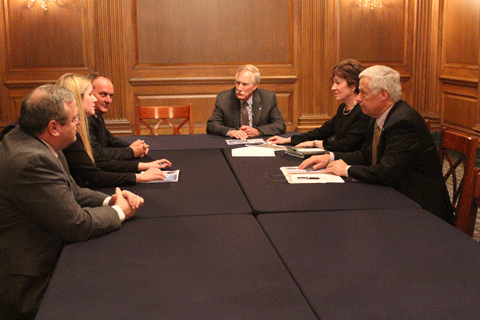
From left to right, Cate Street executives Ned Dwyer, Alexandra Ritchie, John Halle.
On the right, Senators Angus King and Susan Collins and congressman Mike Michaud. |
To try to restore several hundred mill jobs to the historic paper-making North Country towns of Millinocket and East Millinocket, Maine’s politicians, in a bipartisan manner, have given away and are planning to give away millions of taxpayer dollars to various corporate interests, including big, out-of-state banks.
In light of the recent shutdown of the East Millinocket paper mill by its owner, Cate Street Capital, a New Hampshire financier that’s a major beneficiary of the state’s largesse, this generosity doesn’t appear to be working.
This article focuses on just one striking example of the payments piling up in this financial and human drama: an obscure, misleadingly named, and significant drain on the state treasury called New Markets Tax Credits, administered by the Finance Authority of Maine (FAME). More examples are briefly listed in the sidebar, “Other giveaways.”
In 2012 the very first FAME New Markets deal netted Cate Street $10.6 million, according to the company’s numbers, to support its restart of the East Millinocket mill, which had been shuttered by its immediately previous owner, Brookfield Asset Management, of Canada. For the mill, Cate Street revived the name Great Northern. For decades in the 20th century, Great Northern Paper Co. operated mills in both East Millinocket and Millinocket.
Last August the agency began the process of pouring another $7 million of New Markets money into Cate Street’s coffers. The new funds will enable the construction in Millinocket of a wood-pellet plant on the site of the former paper mill there, which Cate Street also owns and is dismantling for scrap. The pellet plant will employ all of 36 people.
New Markets deals are so complex only a lobbyist could love them. Simply put, according to calculations Cate Street provided to the Phoenix, besides the $7 million the company will receive, taxpayers will pay, over seven years, an additional $8.6 million to a big bank, a middleman private agency or agencies, and attorneys, making a grand total of $15.6 million. It’s as if the public were borrowing $7 million to give to Cate Street and paying $8.6 million for the privilege.
The money will be sunk into an enterprise that FAME’s staff has said will use unproven technology to create a product, “torrefied” wood, for which there’s no established market. When burned in power plants, it supposedly produces fewer
carbon emissions than coal. Cate Street has set up a subsidiary called Thermogen to run the pellet plant.
The project is so dubious that FAME’s staff last fall opposed a separate deal, a $25-million FAME bond issue for Thermogen-Cate Street. The staff was overruled by a divided board under pressure from Republican Governor Paul LePage (see sidebar).
“Refundable” tax “credits”
The New Markets Tax Credits story began in 2011 when the Legislature unanimously and without debate passed a bill establishing the program. The idea is to assist companies in low-income communities.